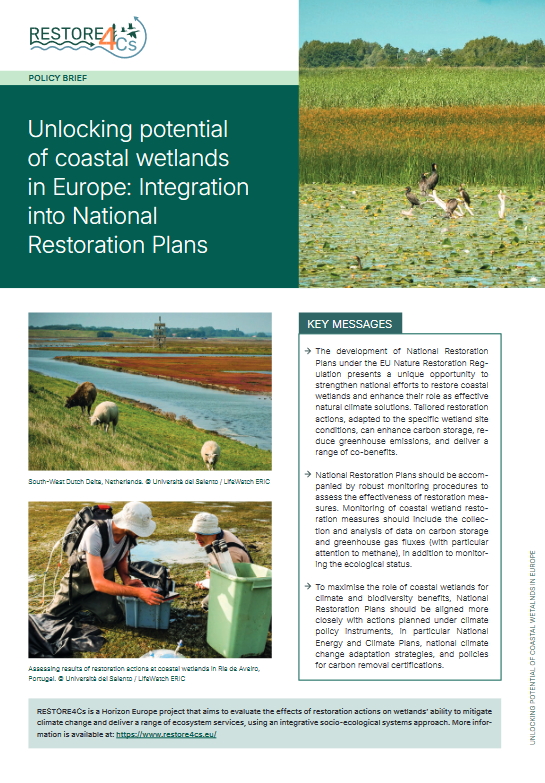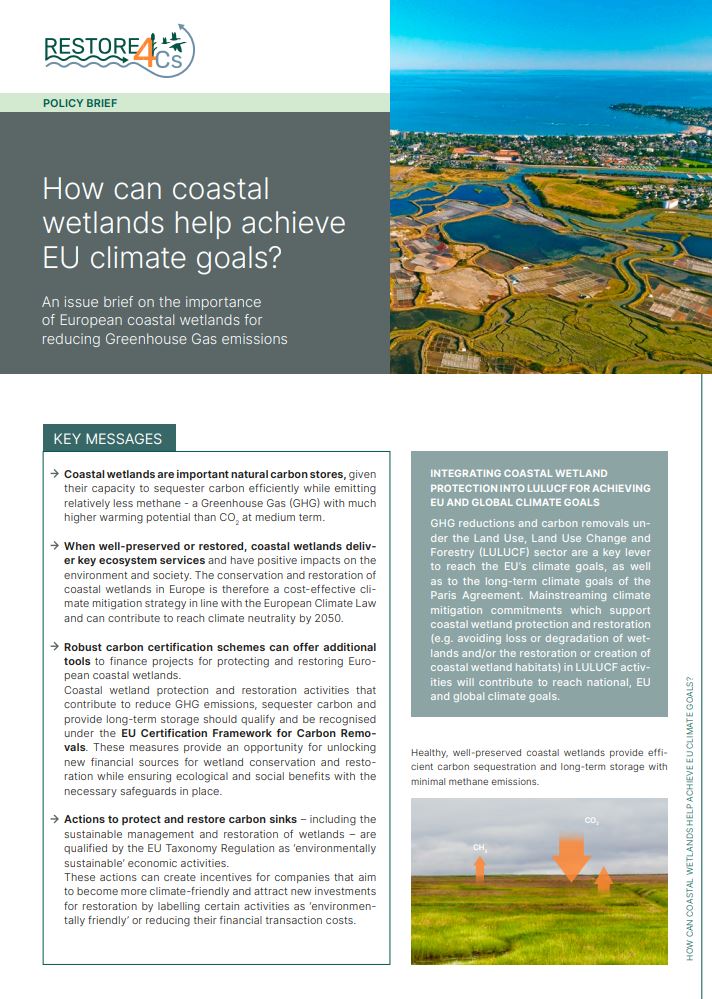Modelling Restoration of Wetlands for Carbon Pathways, Climate Change Mitigation and Adaptation, Ecosystem Services, and Biodiversity, Co-benefits (RESTORE4Cs)
- Project
- Research Program
- Duration
-
-
Healthy wetlands are acknowledged for being among the most effective sinks for carbon and for providing other valuable ecosystem services. In contrast, human-impacted wetlands represent a major source of greenhouse gases (GHG). Important research questions on the GHG abatement potential of wetland restoration and on management and restoration actions to maintain and promote the mitigation and adaptation capacity of European wetlands are still to be answered due to major data and knowledge gaps. The RESTORE4Cs project (a 3-year Research and Innovation Action funded by the EU) aims to fill this gap by assessing the role of restoration action in wetlands climate change mitigation capacity and for the provision of a wide range of ecosystem services using an integrative socio-ecological systems approach.
The results of RESTORE4Cs will support the implementation of climate and biodiversity policies in the context of the European Green Deal. The project brings together 16 partners from across Europe, including research institutions from natural and social sciences, research-oriented SMEs, NGOs and international intergovernmental organisations.
Project objectives and activities
Focusing on coastal wetlands across Europe, RESTORE4Cs will:
- Deliver standardised methodologies and approaches for the prioritisation of restoration promoting carbon-storage and greenhouse gasses (GHG) emissions abatement, while improving the ecological status of wetlands and the provision of additional ecosystem services such as flood regulation and coastal erosion protection.
- Gather effectiveness data on restoration and land use management actions in terms of climate services and other ecosystem and socio-economic services from six Case Pilot sites across European coastal areas and from meta-analysis.
- Upscale models and integrative assessment tools to wider geographical (European) and ecological (other wetland types, including floodplains and peatlands) contexts using remote sensing and machine learning methods to develop an integrated status assessment of European wetlands.
- Integrate the results into a digital platform to serve as a Decision Support System for stakeholders that will steer project efforts as part of a newly created Community of Practice around wetland restoration.
The role of Ecologic Institute
Ecologic Institute leads a work package dedicated to policy relevance, that aims to align the project methodology and outcomes with key EU and global policy objectives on biodiversity protection and climate adaptation and mitigation and to support their implementation. This work package will assess the extent to which EU and national policies help achieve or hinder wetland restoration and the delivery of key ecosystem services (e.g., carbon storage, biodiversity, disaster risk reduction) and will document the needs for concrete definitions, data, methods and tools of decision-makers and practitioners to implement policy targets for wetland restoration from the Biodiversity Strategy 2030, the upcoming EU Nature Restoration Regulation, and recent revisions of the LULUCF Regulation. Further, we will synthesise in Policy Briefs the key policy-relevant project insights for decision-makers and practitioners and will develop guidance to assist national authorities and practitioners on the use of RESTORE4Cs methods and tools to address key policy targets.
In addition, Ecologic Institute will perform an economic assessment of restored wetlands to advice policy-making. The economic assessment will include 1) an estimation of abatement costs of wetlands restoration actions; and 2) an investigation into their economic benefits in terms of abatement potential for C-storage and GHG emission reductions and other relevant ecosystem services accounted as co-benefits. Finally, the application of suitable financing schemes to fund wetlands restoration according to different assessment criteria will be investigated.




